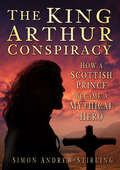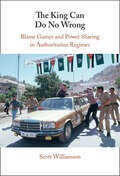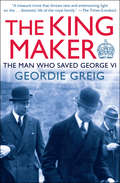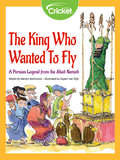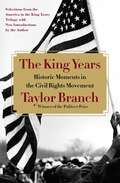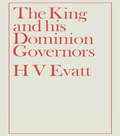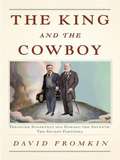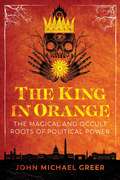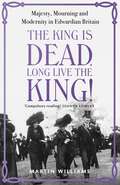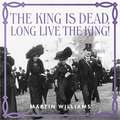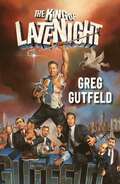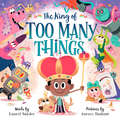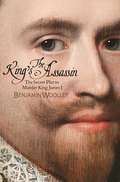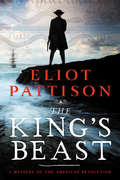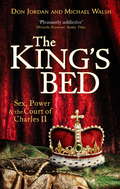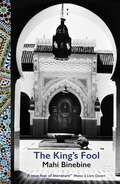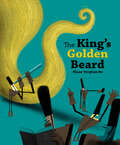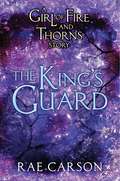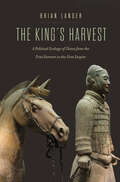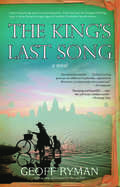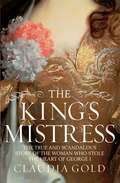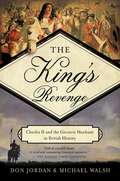- Table View
- List View
The King Arthur Conspiracy: How a Scottish Prince Became a Mythical Hero
by Simon StirlingArthur led the Britons to the brink of victory but was cut down by treachery and betrayal. Arthurian legends have since been corrupted, leading to popular but false assumptions about the king and the belief that his grave could never be found. Drawing on a vast range of sources and new translations of early British and Gaelic poetry, Arthur explodes these myths and exposes the shocking truth. In this, the first full biography of Arthur, Simon Andrew Stirling provides a range of proofs that Artuir mac Aedain was the original King Arthur; he identifies the original Camelot, the site of Arthur’s last battle and his precise burial location. For the first time ever, the role played by the early Church in Arthur’s downfall and the fall of North Britain is also revealed. This includes the Church’s contribution to fabricated Arthurian history, the unusual circumstances of his burial and the extraordinary history of the sacred isle on which he was buried.
The King Can Do No Wrong: Blame Games and Power Sharing in Authoritarian Regimes
by Scott WilliamsonWhy are some autocrats more effective than others at retaining popular support even when their governments perform poorly? To develop insights into popular politics and governance across authoritarian regimes, this book stresses the importance of understanding autocratic blame games. Scott Williamson argues that how autocrats share power affects their ability to shift blame, so that they are less vulnerable to the public's grievances when they delegate decision-making powers to other political elites. He shows that this benefit of power-sharing influences when autocrats limit their control over decision-making, how much they repress, and whether their regimes provide accountability. He also argues that ruling monarchs are particularly well positioned among autocrats to protect their reputations by sharing power, which contributes to their surprising durability in the modern world. Drawing on extensive fieldwork in Jordan and cross-national analysis of autocracies, the book illustrates the important role of blame in the politics of authoritarian regimes.
The King Maker: The Man Who Saved George VI
by Geordie Greig&“A treasure trove that throws new and entertaining light&” on the friendship between the WWII-era king and the man who inspired The King&’s Speech (The Times, London). Louis Greig, a war hero and rugby international, entered the privileged world of the British royal family as mentor, physician, and friend to a young and hesitant Prince Albert, the man who became King George VI and whose challenges were so vividly brought to life in the award-winning film The King&’s Speech. Greig&’s influence helped to guide the prince from a stammering, shy schoolboy to become one of the most respected constitutional monarchs, seeing the nation through the Second World War and bringing the monarchy closer to the people. Geordie Greig, grandson of Louis Greig, has drawn on private family papers and public archives to reveal an intimate friendship that lasted almost half a century.
The King Who Wanted to Fly
by Marilyn BolchunosKai Kaus, a Shah in Persia, wants to be the first man to fly! Instead of listening to his advisors, he comes up with a crazy plan. With the help of four eagles and a special chair, he invents a special contraption that will take him far away. Will his flying machine work? Or will this idea end in disaster?
The King Years: Historic Moments in the Civil Rights Movement
by Taylor BranchThe essential moments of the Civil Rights Movement are set in historical context by the Pulitzer Prize-winning author of the magisterial America in the King Years trilogy—Parting the Waters; Pillar of Fire; and At Canaan&’s Edge.Taylor Branch, author of the Pulitzer Prize–winning America in the King Years trilogy, presents selections from his monumental work that recount the essential moments of the Civil Rights Movement. A masterpiece of storytelling on race and democracy, violence and nonviolence, The King Years delivers riveting tales of everyday heroes whose stories inspire us still. Here is the full sweep of an era that transformed America and continues to offer crucial lessons for today&’s world. This vital primer amply fulfills Branch&’s dedication: &“For students of freedom and teachers of history.&”
The King and His Dominion Governors, 1936
by Herbert Vere EvattFirst Published in 1967. The method or system of government in the United Kingdom and the self-governing Dominions may be described with sufficient accuracy as that of a political democracy under the Crown. This study is published because the author is convinced that constant research into, and analysis of, all the present-day implications and tendencies of such method or system are essential.
The King and the Cowboy
by David FromkinThe story of the unlikely friendship between King Edward the Seventh of England and President Theodore Roosevelt, which became the catalyst for an international power shift and the beginning of the American century. In The King and the Cowboy, renowned historian David Fromkin reveals how two unlikely world leaders-Edward the Seventh of England and Theodore Roosevelt-recast themselves as respected political players and established a friendship that would shape the course of the twentieth century in ways never anticipated. In 1901, these two colorful public figures inherited the leadership of the English-speaking countries. Following the death of his mother, Queen Victoria, Edward ascended the throne. A lover of fine food, drink, beautiful women, and the pleasure-seeking culture of Paris, Edward had previously been regarded as a bon vivant. The public-even Queen Victoria herself-doubted Edward's ability to rule the British Empire. Yet Edward would surprise the world with his leadership and his canny understanding of the fragility of the British Empire at the apex of its global power. Across the Atlantic, Vice President Roosevelt-the aristocrat from Manhattan who fashioned his own legend, going west to become a cowboy-succeeded to the presidency after President McKinley's 1901 assassination. Rising above criticism, Roosevelt became one of the nation's most beloved presidents. The King and the Cowboyprovides new perspective on both Edward and Roosevelt, revealing how, at the oft-forgotten Algeciras conference of 1906, they worked together to dispel the shadow cast over world affairs by Edward's ill-tempered, power-hungry nephew, Kaiser Wilhelm II of Germany. At Algeciras, the U. S and major European powers allied with Britain in protest of Germany's bid for Moroccan independence. In an unlikely turn of events, the conference served to isolate Germany and set the groundwork for the forging of the Allied forces. The King and the Cowboyis an intimate study of two extraordinary statesmen who-in part because of their alliance at Algeciras-would become lauded international figures. Focusing in particular on Edward the Seventh's and Theodore Roosevelt's influence on twentieth-century foreign affairs, Fromkin's character-driven history sheds new light on the early events that determined the course of the century.
The King in Orange: The Magical and Occult Roots of Political Power
by John Michael Greer• Details the magical war that took place behind the scenes of the 2016 election • Examines in detail the failed magical actions of Trump&’s opponents, with insights on political magic from Dion Fortune&’s war letters • Reveals the influence of a number of occult forces from Julius Evola to chaos magick to show how the political and magical landscape of American society has permanently changed since the 2016 election Magic and politics seem like unlikely bedfellows, but in e King in Orange, author John Michael Greer goes beyond super cial memes and extreme partisanship to reveal the unmentionable realities that spawned the unexpected presidential victory of an elderly real-estate mogul turned reality-TV star and which continue to drive the deepening divide that is now the de ning characteristic of American society. Greer convincingly shows how two competing schools of magic were led to contend for the presidency in 2016 and details the magical war that took place behind the scenes of the campaign. rough the in uence of a number of occult forces, from Julius Evola to chaos magicians as well as the cult of positive thinking, Greer shows that the main contenders in this magical war were the status quo magical state--as de ned by the late scholar Ioan Couliano--which has repurposed the &“manipulative magic&” techniques of the Renaissance magi into the subliminal techniques of modern advertising, and an older, deeper, and less reasonable form of magic--the &“magic of the excluded&”--which was employed by chaos magicians and alt-right internet wizards, whose desires coalesced in the form of a frog avatar that led the assault against the world we knew. Examining in detail the magical actions of Trump&’s opponents, with insights on political magic from occultist Dion Fortune&’s war letters, the author discusses how the magic of the privileged has functioned to keep the comfortable classes from being able to respond e ectively to the populist challenge and how and why the &“Magic Resistance,&” which tried to turn magic against Trump, has failed. Showing how the political and magical landscape of American society has permanently changed since the 2016 election cycle, Greer reveals that understanding the coming of the King in Orange will be a crucial step in making sense of the world for a long time to come.
The King is Dead, Long Live the King!: Majesty, Mourning and Modernity in Edwardian Britain
by Martin WilliamsThe Times Book of the Week * * * 'I could read Martin Williams all day. He is a staggeringly communicative historian; this book throws shafts of light on recent history almost repeating itself, giving vivid glimpses into monarchy and the way things were, and are. Compulsory reading.' --- Dame Joanna Lumley'A social historian and gifted storyteller, Williams is by turns moved and amused as he reflects on the poignancy and rituals of a nation united (pretty much) in grief...' --- The Times'Vivid, panoramic, skilfully written, this gripping book is an insight into a time and an age'. --- Kate Williams'Martin Williams has written a fascinating and absorbing account of the Edwardian era, the demise and funeral of the King, and the iconic Black Ascot that followed it. He has brought a lost age grippingly to light'. --- Hugo Vickers'witty, informative and immensely readable... captures the spirit of the times'. --- Miranda Seymour'A tour de force'. --- Dr Kate Strasdin'We tend to think that Cecil Beaton single-handedly invented the Edwardian Age. Martin Williams shows us succinctly and elegantly that perhaps it was the King himself.' --- Nicky Haslam'... moves with unflagging wit and style. A fresh perspective on a brilliant life and a lost era beautifully evoked, it is impossible not to be swept away by this gem of a book. Pure pleasure.' --- Robin MuirUnforgettable as it was, the public response to the death of Queen Elizabeth II in September 2022 was not without precedent. When her great-grandfather King Edward VII - glamorous, cosmopolitan and extraordinarily popular - died in May 1910, the political, social and cultural anxieties of a nation in turmoil were temporarily set aside during a summer of intense and ritualised mourning.In The King is Dead, Long Live the King! Martin Williams charts a period of tension and transition as one era slipped away and another took shape. Witnessed by a diverse but interconnected cast of characters - crowned heads and Cabinet ministers, debutantes and suffragettes, artists and murderers - here is the swansong of Edwardian Britain. Set against a backdrop of bereavement and parliamentary crisis overshadowed by the gathering clouds of war, we see a people caught between past and future, tradition and modernity, as they unite to bid farewell to a much-loved monarch who had personified his age. From Buckingham Palace to Bloomsbury, and from the lying-in-state in Westminster Hall to a now legendary Royal Ascot enveloped in black, this is a vivid evocation of a world on the brink of seismic upheaval.
The King is Dead, Long Live the King!: Majesty, Mourning and Modernity in Edwardian Britain
by Martin WilliamsThe Times Book of the Week * * * 'I could read Martin Williams all day. He is a staggeringly communicative historian; this book throws shafts of light on recent history almost repeating itself, giving vivid glimpses into monarchy and the way things were, and are. Compulsory reading.' --- Dame Joanna Lumley'A social historian and gifted storyteller, Williams is by turns moved and amused as he reflects on the poignancy and rituals of a nation united (pretty much) in grief...' --- The Times'Vivid, panoramic, skilfully written, this gripping book is an insight into a time and an age'. --- Kate Williams'Martin Williams has written a fascinating and absorbing account of the Edwardian era, the demise and funeral of the King, and the iconic Black Ascot that followed it. He has brought a lost age grippingly to light'. --- Hugo Vickers'witty, informative and immensely readable... captures the spirit of the times'. --- Miranda Seymour'A tour de force'. --- Dr Kate Strasdin'We tend to think that Cecil Beaton single-handedly invented the Edwardian Age. Martin Williams shows us succinctly and elegantly that perhaps it was the King himself.' --- Nicky Haslam'... moves with unflagging wit and style. A fresh perspective on a brilliant life and a lost era beautifully evoked, it is impossible not to be swept away by this gem of a book. Pure pleasure.' --- Robin MuirUnforgettable as it was, the public response to the death of Queen Elizabeth II in September 2022 was not without precedent. When her great-grandfather King Edward VII - glamorous, cosmopolitan and extraordinarily popular - died in May 1910, the political, social and cultural anxieties of a nation in turmoil were temporarily set aside during a summer of intense and ritualised mourning.In The King is Dead, Long Live the King! Martin Williams charts a period of tension and transition as one era slipped away and another took shape. Witnessed by a diverse but interconnected cast of characters - crowned heads and Cabinet ministers, debutantes and suffragettes, artists and murderers - here is the swansong of Edwardian Britain. Set against a backdrop of bereavement and parliamentary crisis overshadowed by the gathering clouds of war, we see a people caught between past and future, tradition and modernity, as they unite to bid farewell to a much-loved monarch who had personified his age. From Buckingham Palace to Bloomsbury, and from the lying-in-state in Westminster Hall to a now legendary Royal Ascot enveloped in black, this is a vivid evocation of a world on the brink of seismic upheaval.
The King is Dead, Long Live the King!: Majesty, Mourning and Modernity in Edwardian Britain
by Martin WilliamsThe rich and fascinating story of the events surrounding the year 1910 when King Edward VII died, sending shockwaves through Britain and changing the country forever.Unforgettable as it was, the public response to the death of Queen Elizabeth II in September 2022 was not without precedent. When her great-grandfather King Edward VII - glamorous, cosmopolitan and extraordinarily popular - died in May 1910, the political, social and cultural anxieties of a nation in turmoil were temporarily set aside during a summer of intense and ritualised mourning.In The King is Dead, Long Live the King! Martin Williams charts a period of tension and transition as one era slipped away and another took shape. Witnessed by a diverse but interconnected cast of characters - crowned heads and Cabinet ministers, debutantes and suffragettes, artists and murderers - here is the swansong of Edwardian Britain. Set against a backdrop of bereavement and parliamentary crisis overshadowed by the gathering clouds of war, we see a people caught between past and future, tradition and modernity, as they unite to bid farewell to a much-loved monarch who had personified his age. From Buckingham Palace to Bloomsbury, and from the lying-in-state in Westminster Hall to a now legendary Royal Ascot enveloped in black, this is a vivid evocation of a world on the brink of seismic upheaval.(P) 2023 Hodder & Stoughton Limited
The King of Late Night
by Greg GutfeldGreg Gutfeld, five-time New York Times bestselling author and host of the #1 rated late night show GUTFELD!, returns with a witty and tongue-in-cheek essay collection that is part memoir and part political manifesto. <p><p> Greg Gutfeld is back with a hilarious essay collection about how he destroyed the mainstream late night landscape of heavyweights and became host of the #1 late night show in all of television. With his signature wit and whip-smart humor, Greg reveals never-before-told stories of his upbringing and early career, what it’s like going head-to-head with the liberal media, and what it took to flip the script on the comedy landscape. <p><p> How did the former health magazine editor take a show in a throwaway time slot in the middle of the night and turn it into a cult classic? And how did that show, Redeye, catapult Greg to The Five, the most watched show on TV, and GUTFELD!, his own late-night spot, with millions of viewers each night? Buckle up, because this story is one hell of a ride, especially if Greg is driving. <p> <b>New York Times Bestseller</b>
The King of Too Many Things
by Laurel Snyder Aurore DamantKing Jasper can order his wizard to conjure up anything at all: dragons, robots, superheroes, even rainbow-colored kittens—which leads to a magical mess only he can clean up. <P><P>A hilarious, modern fairy tale, The King of Too Many Things will keep readers guessing with the turn of every page, while showing how always wanting more can ultimately lead to less happiness.
The King's Assassin: The Secret Plot to Murder King James I
by Benjamin WoolleyAn absorbing account of the conspiracy to kill King James I by his handsome lover, the Duke of Buckingham, an historical crime that has remained hidden for 400 years.The rise of George Villiers from minor gentry to royal power seemed to defy gravity. Becoming gentleman of the royal bedchamber in 1615, the young gallant enraptured James, Britain’s first Stuart king, royal adoration reaching such an intensity that the king declared he wanted the courtier to become his ‘wife’. For a decade, Villiers was at the king’s side – at court, on state occasions, and in bed, right up to James’s death in March 1625.Almost immediately, Villiers’ many enemies accused him of poisoning the king. A parliamentary investigation was launched, and scurrilous pamphlets and ballads circulated London’s streets. But the charges came to nothing, and were relegated to a historical footnote. Now, new research suggests that a deadly combination of hubris and vulnerability did indeed drive Villiers to kill the man who made him. It may have been by accident – the application of a quack remedy while the king was weakened by a malarial attack. But there is compelling evidence that Villiers, overcome by ambition and frustrated by James’s passive approach to government, poisoned him.In The King’s Assassin, acclaimed author Benjamin Woolley examines this remarkable, even tragic story. Combining vivid characterization and a strong narrative with historical scholarship and forensic investigation, Woolley tells the story of King James’s death, and of the captivating figure at its center.
The King's Beast: A Mystery of the American Revolution
by Eliot PattisonA simple task to retrieve some artifacts turns into a nightmare of deceit when Duncan McCallum finds himself the target of those obsessed with keeping America under British rule in this thrilling historical novel from an Edgar Award–winning author.When Duncan McCallum is asked by Benjamin Franklin to retrieve an astonishing cache of fossils from the Kentucky wilderness, his excitement as a naturalist blinds him to his treacherous path. But as murderers stalk him Duncan discovers that the fossils of this American incognitum are not nearly as mysterious as the political intrigue driving his mission. The Sons of Liberty insist, without explaining why, that the only way to keep the king from pursuing a bloody war with America is for Duncan to secretly deliver the fossils to Franklin in London.His journey becomes a maze of deceit and violence as he seeks the cryptic link between the bones and the king. Every layer that Duncan peels away invites new treachery by those obsessed with crushing American dissent. With each attempt on his life, Duncan questions the meaning of the liberty he and the Sons seek. His last desperate hope for survival, and the rescue of his aged native friend Conawago―imprisoned in Bedlam―requires the help of freed slaves, an aristocratic maiden, a band of street urchins, and the gods of his tribal allies.
The King's Bed: Sex, Power and the Court of Charles II
by Michael Walsh Don JordanTo refer to the private life of Charles II is to abuse the adjective. His personal life was anything but private. His amorous liaisons were largely conducted in royal palaces surrounded by friends, courtiers and literally hundreds of servants and soldiers. Gossip radiated throughout the kingdom. Charles spent most of his wealth and his intellect on gaining and keeping the company of women, from the lowest sections of society such as the actress Nell Gwyn to the aristocratic Louise de Kérouaille. Some of Charles' women played their part in the affairs of state, colouring the way the nation was run. Don Jordan and Michael Walsh take us inside Charles' palace, where we will meet court favourites, amusing confidants, advisors jockeying for political power, mistresses past and present as well as key figures in his inner circle such as his 'pimpmasters' and his personal pox doctor.The astonishing private life of Charles II reveals much about the man he was and why he lived and ruled as he did. The King's Bed tells the compelling story of a king ruled by his passion.
The King's Bed: Sex, Power and the Court of Charles II
by Michael Walsh Don JordanTo refer to the private life of Charles II is to abuse the adjective. His personal life was anything but private. His amorous liaisons were largely conducted in royal palaces surrounded by friends, courtiers and literally hundreds of servants and soldiers. Gossip radiated throughout the kingdom. Charles spent most of his wealth and his intellect on gaining and keeping the company of women, from the lowest sections of society such as the actress Nell Gwyn to the aristocratic Louise de Kérouaille. Some of Charles' women played their part in the affairs of state, colouring the way the nation was run. Don Jordan and Michael Walsh take us inside Charles' palace, where we will meet court favourites, amusing confidants, advisors jockeying for political power, mistresses past and present as well as key figures in his inner circle such as his 'pimpmasters' and his personal pox doctor.The astonishing private life of Charles II reveals much about the man he was and why he lived and ruled as he did. The King's Bed tells the compelling story of a king ruled by his passion.
The King's Fool
by Mahi BinebineSidi is dying.In the last days of this all-powerful tyrant, his faithful court fool takes stock of the decades he has spent in the king's service. For the many years have left certain indelible wounds.During his service, the fool has been the king's closest counsel, his most trusted companion and adviser, privy to the king's deepest secrets and most intimate thoughts. It is an honoured position for which many other courtiers would pay a hefty price. Something the fool understands only too well, for this closeness has indeed come at a terrible cost.What price the confidence of a great king? Is it stories, jokes, witty repartee? Or does the debt fall closer to home? Perhaps it must be paid far from the magnificent palaces, feasting and festivities of the royal court. Perhaps it must be paid in the death jails of a formidable prison fortress far out in the desert; a place so feared that few dare to speak its name . . .
The King's Fool
by Mahi BinebineSidi is dying.In the last days of this all-powerful tyrant, his faithful court fool takes stock of the decades he has spent in the king's service. For the many years have left certain indelible wounds.During his service, the fool has been the king's closest counsel, his most trusted companion and adviser, privy to the king's deepest secrets and most intimate thoughts. It is an honoured position for which many other courtiers would pay a hefty price. Something the fool understands only too well, for this closeness has indeed come at a terrible cost.What price the confidence of a great king? Is it stories, jokes, witty repartee? Or does the debt fall closer to home? Perhaps it must be paid far from the magnificent palaces, feasting and festivities of the royal court. Perhaps it must be paid in the death jails of a formidable prison fortress far out in the desert; a place so feared that few dare to speak its name . . .
The King's Golden Beard
by Klaas VerplanckeWho's to blame when a vain, heedless king meets his comeuppance? He is, of course! Fans of Tomi Ungerer's mischievous humor and Jon Agee's sly morality tales will be delighted by this hilarious read-aloud about a long, long beard and its short-sighted royal owner, by a popular Belgian illustrator, designer, and animation whiz.The lush, golden royal beard is a wondrous thing - especially to the king himself. He spends his days admiring and grooming it, and passes laws making it a crime punishable by death for anyone else's face to sport even a single hair. As the people of the kingdom nervously shave daily, the royal beard grows and grows until it appears at the palace's back gate. What happens next will have readers laughing along -- and cheering for the astronomers who, unlike the tyrannical king, know that the earth is round.
The King's Guard
by Rae CarsonHector of Ventierra is the youngest commander of the Royal Guard in his kingdoms history. But before he was lord commander, he was a lowly squire. In this short fantasy novella, set in the world of The Girl of Fire and Thorns, Rae Carson introduces readers to Hector before he became the man Queen Elisa fell in love with. The Kings Guard also includes a teaser chapter for The Bitter Kingdom, the conclusion to the Fire and Thorns trilogy. At fifteen years old, Hector is the youngest squire in the most elite military force in the country. And his first day is disastrous. Everyone assumes the only reason he was recruited is his close personal association with King Alejandro, not because hes really earned it. But Alejandro needs Hector for a secret mission, one that gives him the chance to prove to everyone--including himself--that he is worthy to be a Royal Guard. Hector must break into the ancient Fortress of Wind to retrieve something so important that the kingdoms future depends on it. What Hector finds in the fortress will stretch his bond of friendship with his king near to breaking. And it will prepare him to become the fearsome warrior and lord commander Elisa will never let go. A riveting prequel to Rae Carsons epic and acclaimed Fire and Thorns series.
The King's Harvest: A Political Ecology of China from the First Farmers to the First Empire (Yale Agrarian Studies Series)
by Brian LanderA multidisciplinary environmental history of early China&’s political systems, featuring newly available Chinese archaeological data &“Over four thousand years of unsustainable growth, Chinese states replaced a diverse ecosystem with a monocropping grain state. All states destroy environments, but only the state can save us. So ancient China's spectres still haunt our modern crisis. A brilliant and disturbing analysis!&”—Peter C. Perdue, author of Environmental History in China and the West: Its Origins and Prospects This book is a multidisciplinary study of the ecology of China&’s early political systems up to the fall of the first empire in 207 BCE. Brian Lander traces the formation of lowland North China&’s agricultural systems and the transformation of its plains from diverse forestland and steppes to farmland. He argues that the growth of states in ancient China, and elsewhere, was based on their ability to exploit the labor and resources of those who harnessed photosynthetic energy from domesticated plants and animals. Focusing on the state of Qin, Lander amalgamates abundant new scientific, archaeological, and excavated documentary sources to argue that the human domination of the central Yellow River region, and the rest of the planet, was made possible by the development of complex political structures that managed and expanded agroecosystems.
The King's Last Song
by Geoff Ryman"[Ryman] has not so much created as revealed a world in which the promise of redemption takes seed even in horror."--The Boston Globe"Sweeping and beautiful. . . . The complex story tears the veil from a hidden world."--The Sunday Times"Inordinately readable . . . extraordinary in its detail, color and brutality."--The Independent"Ryman has crafted a solid historical novel with an authentic feel for both ancient and modern Cambodia."--Washington DC City Paper"Another masterpiece by one of the greatest fiction writers of our time."--Kim Stanley Robinson"Ryman's knack for depicting characters; his ability to tell multiple, interrelated stories; and his knowledge of Cambodian history create a rich narrative that looks at Cambodia's "killing fields" both recent and ancient and Buddhist belief with its desire for transcendence. Recommended for all literary fiction collections."--Library JournalArcheologist Luc Andrade discovers an ancient Cambodian manuscript inscribed on gold leaves but is kidnapped--and the manuscript stolen--by a faction still loyal to the ideals of the brutal Pol Pot regime. Andrade's friends, an ex-Khmer Rouge agent and a young motoboy, embark on a trek across Cambodia to rescue him. Meanwhile, Andrade, bargaining for his life, translates the lost manuscript for his captors. The result is a glimpse into the tremendous and heart-wrenching story of King Jayavarman VII: his childhood, rise to power, marriage, interest in Buddhism, and the initiation of Cambodia's golden age. As Andrade and Jayavarman's stories interweave, the question becomes whether the tale of ancient wisdom can bring hope to a nation still suffering from the violent legacy of the last century.Geoff Ryman is the author of the novels Air (winner of Arthur C Clarke and James Tiptree awards) and The Unconquered Country (a World Fantasy Award winner). Canadian by birth, he has lived in Cambodia and Brazil and now teaches creative writing at the University of Manchester in England.
The King's Mistress: Scandal, Intrigue and the True Story of the Woman Who Stole George I's Heart
by Claudia GoldAs the mistress and possible secret wife of George I, Ehrengard Melusine von der Schulenburg, was England's first Georgian queen in all but name. Her nickname amongst the English, who loathed her and found her scrawny, was 'the Maypole'. Others sources complained she was old: she was hideous; she had appalling dress sense and was bald; she was excessive in her greed; she had no love for George and would have 'sold him to the highest bidder'; she was dim-witted; she was dull; she stood by passively as George pursued younger and more attractive mistresses; she condoned incest, willingly sharing George's affections and his bed with his half-sister, Sophia Charlotte. Yet this scandalous gossip only tells one kind of story. It doesn't mention how Melusine charmed George away from his wife, the beautiful and tempestuous wife, Sophia Dorothea of Celle, and bound him to her until his death. Nor does it show how her gentle nature and good sense helped keep George's notoriously dysfunctional family from tearing itself apart. The brutal English press, who pursued her mercilessly, gave Melusine no credit for her astonishing rise from minor courtier to the ranks of the most powerful women in Europe, or for her love of music that saw her mixing with everyone from George Frideric Handel to the flamboyant theatrical impresario John James Heidegger. In The King's Mistress Claudia Gold brings Melusine, and the many contradictions that make her such a fascinating character to vivid life.
The King's Revenge: Charles II and the Greatest Manhunt in British History
by Michael Walsh Don JordanSet in an age of intrigue and espionage, this is the story of the greatest manhunt in British history: the quest for retribution upon the traitors who brought about the death of Charles I. When Charles I was executed, his son Charles II made it his role to seek out retribution, producing the biggest manhunt Britain had ever seen, one that would span Europe and America and would last for thirty years. "We shall pursue and bring to their due punishment those bloody traitors who were either actors or contrivers of that unparalleled and inhuman murder." So vowed the nineteen-year-old Prince of Wales, following the beheading of his father Charles I in January 1649. From exile, he instigated what became the biggest manhunt the nation had ever seen, spreading out across Europe and America and lasting for over thirty years. When he ascended to the throne in 1660 as Charles II, his search for revenge intensified, with show trials in London and assassination squads scouring foreign countries. Many of the most senior figures in England were hanged, drawn and quartered; imprisoned for life; or consigned to a self-imposed exile, in constant fear of the assassin's bullet. History has painted the regicides and their supporters as fanatics, but among them were exceptional men, including John Milton, poetic genius and political propagandist; Oliver Cromwell's steely son-in-law, Henry Ireton; and the errant son of an earl, Algernon Sidney, whose writings helped inspire the founders of the American Revolution. Cromwell himself was subjected to the most bizarre symbolic revenge when—though long-dead—his body was disinterred and beheaded. Set in an age of intrigue and betrayal, The King's Revenge brings these remarkable figures vividly to life in an engrossing tale of ambition, double agents, and espionage.
